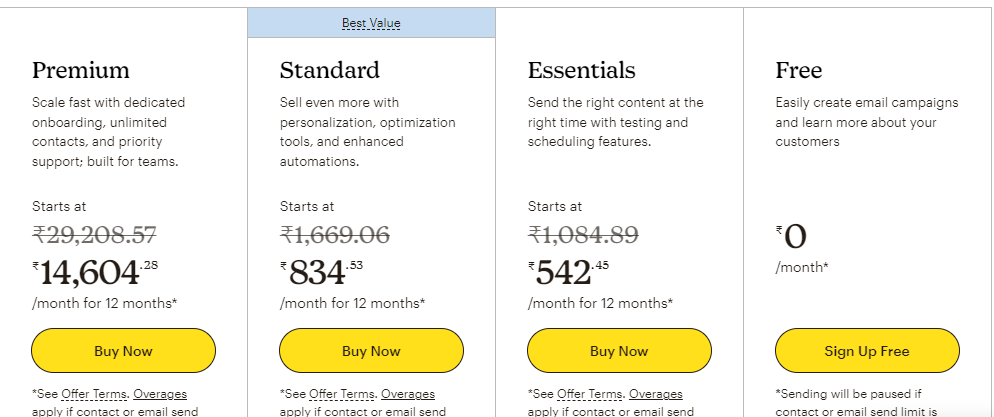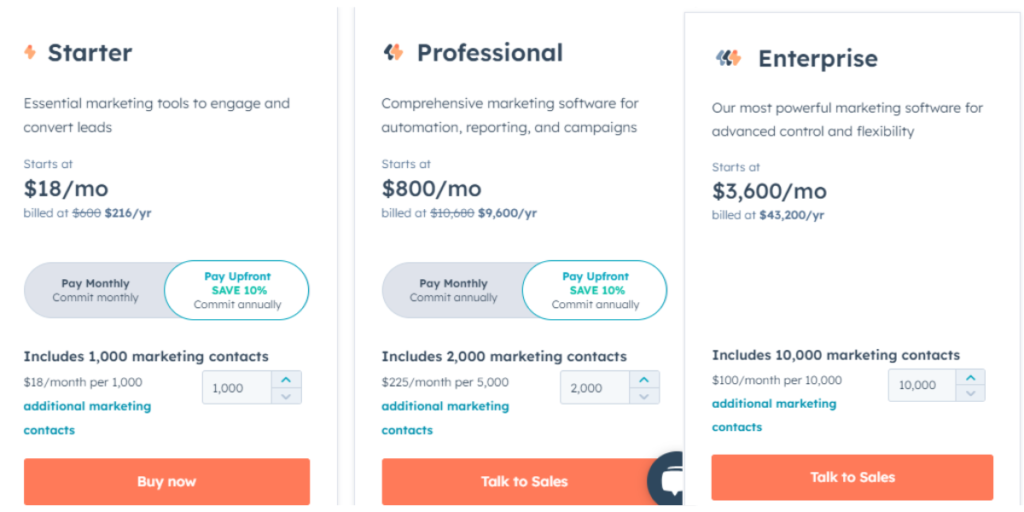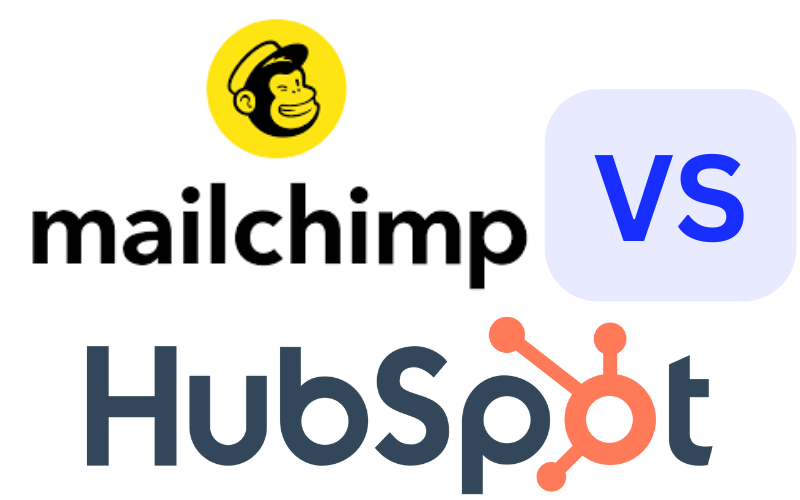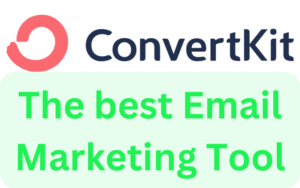Discover the perfect fit for your email marketing endeavors by comparing Mailchimp vs. HubSpot. Explore pricing plans, ease of use, features, and more. Make an informed decision with insights into analytics, customer support, and real user experiences.
Embarking on an email marketing journey? Uncover the nuances of two industry giants in our comprehensive comparison of Mailchimp vs. HubSpot. From pricing and ease of use to features, analytics, and customer support, we dissect each aspect to guide you towards the optimal platform for your marketing success.
Table of Contents
Pricing
Let’s delve into the pricing plans of Mailchimp vs. HubSpot to help you make an informed choice.
Mailchimp Pricing:
Mailchimp offers a tiered pricing system designed for businesses of all sizes, including a free plan for those just starting out. Here’s a brief overview:

- Free Plan: Ideal for beginners, this plan allows you to send basic email campaigns to a limited number of subscribers at no cost.
- Essentials: As your needs grow, the Essentials plan offers expanded features such as advanced audience insights and increased sending limits. Pricing is based on the number of subscribers.
- Standard: For more extensive marketing requirements, the Standard plan provides additional features like A/B testing and advanced automation.
- Premium: Tailored for large enterprises, the Premium plan includes advanced segmentation and multivariate testing.
HubSpot Pricing:
HubSpot, on the other hand, adopts a more comprehensive approach to pricing, offering an all-in-one platform for marketing, sales, and customer service. Here’s a snapshot of their pricing:

- Starter: Geared towards beginners, this plan provides basic features for a reasonable price.
- Professional: As your business grows, the Professional plan offers more advanced marketing automation tools and analytics.
- Enterprise: Tailored for large enterprises, the Enterprise plan includes additional features such as advanced reporting and custom event triggers.

- Free Tools: Start generating and emailing new leads, and measuring your success — for free. No Credit Card Reqiured.
Ease of Use
When diving into the realm of email marketing, the user interface and overall usability of a platform can significantly impact your experience. Let’s explore the ease of use for both Mailchimp and HubSpot to help you determine which aligns best with your workflow.
Mailchimp:
Known for its user-friendly interface, Mailchimp has consistently aimed to make email marketing accessible to everyone, from beginners to seasoned marketers. Here’s what you can expect regarding ease of use:
- Intuitive Dashboard: Mailchimp’s dashboard is designed with simplicity in mind, providing an intuitive layout for easy navigation.
- Drag-and-Drop Editor: Crafting emails is a breeze with Mailchimp’s drag-and-drop editor, allowing you to create visually appealing campaigns without any coding skills.
- Automation Workflows: Setting up automation is straightforward, with pre-built automation workflows and easy customization options.
HubSpot:
HubSpot, being an all-in-one platform, offers a seamless user experience across its various modules, including email marketing. Here’s a glimpse of its ease of use:
- Unified Dashboard: HubSpot provides a unified dashboard for marketing, sales, and customer service, streamlining your overall experience.
- Content Editor: The content editor in HubSpot is user-friendly, allowing you to create and customize emails effortlessly.
- Integration Across Tools: The platform’s integration across marketing, sales, and service tools ensures a cohesive and intuitive experience.
Features
When comparing email marketing platforms like Mailchimp and HubSpot, understanding the features they offer is crucial. Let’s dissect the key features of each platform to help you make an informed decision for your marketing endeavors.
Mailchimp Features:
- Email Campaigns: Mailchimp excels in providing a robust email campaign system. Design eye-catching newsletters and schedule them with ease.
- Automation: Leverage Mailchimp’s automation tools to set up triggered emails, welcome series, and personalized customer journeys.
- Segmentation: Tailor your campaigns with precision using Mailchimp’s segmentation feature. Target specific audiences based on various criteria.
- Analytics: Gain valuable insights into your campaign performance through Mailchimp’s analytics. Track open rates, click-through rates, and more.
- A/B Testing: Refine your strategies with A/B testing capabilities. Test different elements to optimize your campaigns for better results.
HubSpot Features:
- All-in-One Platform: HubSpot goes beyond email marketing, offering an all-in-one platform covering marketing, sales, and customer service.
- Marketing Automation: Automate repetitive tasks and create complex workflows to nurture leads seamlessly.
- Personalization: HubSpot enables personalized content creation, allowing you to tailor your messages to individual contacts.
- CRM Integration: Tight integration with Customer Relationship Management (CRM) tools ensures a unified approach to customer interactions.
- Advanced Analytics: Dive deep into your marketing performance with HubSpot’s advanced analytics, providing insights across all aspects of your campaigns.
Email Campaigns
Efficient and engaging email campaigns are at the heart of successful email marketing. Let’s explore how Mailchimp and HubSpot handle email campaigns, helping you decide which platform aligns better with your campaign creation needs.
Mailchimp Email Campaigns:
- Intuitive Campaign Builder: Mailchimp’s drag-and-drop editor makes crafting visually appealing campaigns a breeze. No coding skills are required, allowing for quick and easy content creation.
- Template Variety: Choose from a diverse range of professionally designed templates to suit different campaign goals, whether it’s a newsletter, promotional offer, or event announcement.
- Scheduling Options: Easily schedule your campaigns for optimal delivery times, ensuring your audience receives messages when they are most likely to engage.
- Personalization: Tailor your emails with personalization tags to make each message feel unique, fostering a more intimate connection with your audience.
HubSpot Email Campaigns:
- Unified Marketing Hub: HubSpot’s Marketing Hub offers a centralized platform for managing all aspects of your marketing strategy, including seamless email campaign creation.
- Smart Content: Leverage smart content features to dynamically personalize your emails based on the recipient’s behavior, enhancing relevance and engagement.
- Automation Workflows: Build complex automation workflows to nurture leads and guide them through the customer journey, ensuring timely and targeted communication.
- A/B Testing: Refine your email strategy with A/B testing capabilities, allowing you to experiment with different elements to optimize campaign performance.
Integration
Seamless integration with other tools and platforms is crucial for maximizing the efficiency of your email marketing efforts. Let’s explore how Mailchimp and HubSpot handle integrations, ensuring your marketing ecosystem works harmoniously.
Mailchimp Integration:
- Third-Party Integrations: Mailchimp boasts a wide array of integrations with third-party applications, ranging from e-commerce platforms to CRM systems, providing flexibility in expanding your marketing toolkit.
- E-commerce Compatibility: Effortlessly connect Mailchimp with popular e-commerce platforms, allowing you to sync customer data, track purchases, and create targeted campaigns based on customer behavior.
- Social Media Linkage: Integrate Mailchimp with your social media accounts to amplify your reach. Share campaigns on multiple platforms and leverage social data to refine your targeting.
HubSpot Integration:
- All-In-One Platform: HubSpot positions itself as an all-in-one solution, seamlessly integrating marketing, sales, and customer service. The CRM integration ensures a unified approach to managing customer interactions.
- App Marketplace: HubSpot offers an extensive app marketplace, allowing users to connect the platform with various applications to enhance functionality and streamline workflows.
- Salesforce Integration: For businesses heavily reliant on Salesforce, HubSpot offers a robust integration, ensuring a smooth flow of data between your marketing and sales activities.
Analytics and Reporting
Analyzing the performance of your email campaigns is essential for refining your strategy and achieving optimal results. Let’s explore how Mailchimp and HubSpot handle analytics and reporting, providing insights to guide your marketing decisions.
Mailchimp Analytics:
- Overview Dashboard: Mailchimp’s analytics dashboard offers a quick snapshot of key metrics, including open rates, click-through rates, and subscriber growth.
- Campaign Reports: Dive deeper into individual campaign performance with detailed reports. Understand how your audience engages with your content and identify areas for improvement.
- E-commerce Insights: For businesses in the e-commerce realm, Mailchimp provides specific insights into purchase behavior, allowing you to measure the impact of your campaigns on sales.
HubSpot Analytics:
- Unified Analytics Hub: HubSpot’s analytics hub provides a centralized location for tracking the performance of your marketing efforts, including email campaigns, landing pages, and more.
- Customizable Dashboards: Tailor your analytics dashboard to focus on the metrics that matter most to your business. Customize views to gain a comprehensive understanding of your marketing performance.
- Attribution Reporting: HubSpot goes beyond basic analytics, offering attribution reporting to understand the entire customer journey and the touchpoints that contribute to conversions.
Customer Support
Reliable customer support is paramount when navigating the complexities of email marketing platforms. Let’s delve into how Mailchimp and HubSpot address customer support, ensuring you have the assistance you need on your marketing journey.
Mailchimp Customer Support:
- Knowledge Base: Mailchimp provides an extensive knowledge base with articles and guides covering a wide range of topics, offering self-help resources for users.
- Email Support: Access to email support is available for all Mailchimp users. Submit your queries, and the support team aims to provide timely assistance.
- Community Forum: Engage with the Mailchimp community through the forum. Share experiences, seek advice, and learn from the collective knowledge of other users.
HubSpot Customer Support:
- Knowledge Hub: HubSpot offers a comprehensive knowledge base, featuring articles, tutorials, and resources to help users navigate the platform effectively.
- Ticketing System: Users can submit support tickets directly through the HubSpot platform. This system ensures that your queries are addressed in a systematic and organized manner.
- Phone Support: HubSpot provides phone support for users on specific plans, offering direct assistance and a more personalized experience.
Customer Reviews and Testimonials
The experiences of other users can offer valuable insights into the effectiveness and user-friendliness of email marketing platforms. Let’s explore what customers are saying about Mailchimp and HubSpot through reviews and testimonials.
Mailchimp Customer Feedback:
- User-Friendly Interface: Many users praise Mailchimp for its user-friendly interface, making it accessible to beginners and streamlining the email marketing process.
- Template Variety: Customers appreciate the diverse range of professionally designed templates, allowing them to create visually appealing campaigns without extensive design skills.
- Responsive Support: Positive reviews often highlight Mailchimp’s responsive customer support, aiding users in overcoming challenges and maximizing the platform’s potential.
HubSpot Customer Testimonials:
- All-in-One Solution: Users who appreciate the all-in-one approach of HubSpot commend the platform for seamlessly integrating marketing, sales, and customer service.
- Comprehensive Analytics: Positive testimonials emphasize HubSpot’s comprehensive analytics, providing users with in-depth insights to refine their marketing strategies.
- Scalability: Businesses that have grown with HubSpot commend its scalability, noting that the platform evolves to meet the expanding needs of their marketing endeavors.
Conclusion
In the realm of email marketing, choosing the right platform is a decision that significantly impacts the success of your campaigns. After a thorough exploration of Mailchimp and HubSpot, each platform reveals its strengths and unique offerings.
Pricing emerges as a pivotal factor, with Mailchimp providing tiered plans catering to businesses of all sizes, and HubSpot positioning itself as an all-in-one solution.
When it comes to Ease of Use, both Mailchimp and HubSpot excel, with user-friendly interfaces and intuitive tools. The choice between them may depend on your specific workflow and preferences.
The examination of Features highlights the strengths of each platform. Mailchimp shines in its email campaign tools, while HubSpot’s all-in-one platform extends beyond email marketing, encompassing sales and customer service.
For Email Campaigns, Mailchimp’s drag-and-drop editor and template variety offer simplicity, while HubSpot’s unified Marketing Hub provides a centralized space for comprehensive campaign creation.
In terms of Integration, Mailchimp’s extensive third-party integrations and e-commerce compatibility contrast with HubSpot’s all-in-one approach and diverse app marketplace.
Analytics and Reporting are crucial aspects, and both platforms deliver. Mailchimp offers detailed campaign reports, while HubSpot provides customizable dashboards and attribution reporting for a holistic view.
Customer Support is vital for overcoming challenges, and both platforms offer valuable resources. Mailchimp relies on a knowledge base and community forum, while HubSpot provides a ticketing system and phone support.
Lastly, Customer Reviews and Testimonials provide real-world insights. Mailchimp users appreciate its user-friendly interface and template variety, while HubSpot customers praise its all-in-one solution and comprehensive analytics.
In conclusion, the choice between Mailchimp and HubSpot hinges on your unique needs, preferences, and the scale of your marketing operations. Whether you prioritize user-friendliness, advanced features, or seamless integration, both platforms offer robust solutions to elevate your email marketing efforts. Take the time to assess your requirements and make an informed decision that aligns with the goals of your business.




